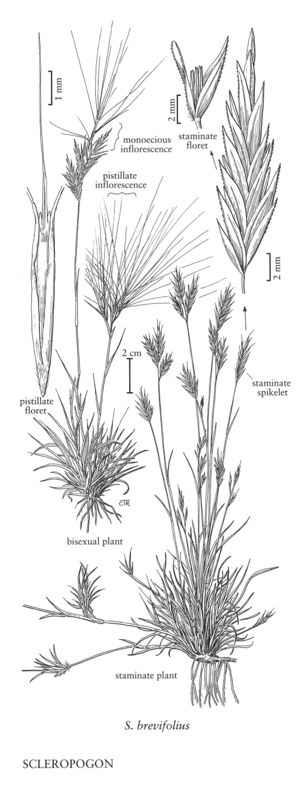Difference between revisions of "Scleropogon brevifolius"
Common names: Burrograss
Treatment appears in FNA Volume 25. Treatment on page 44.
FNA>Volume Importer |
imported>Volume Importer |
||
| (3 intermediate revisions by 2 users not shown) | |||
| Line 39: | Line 39: | ||
|publication year= | |publication year= | ||
|special status= | |special status= | ||
| − | |source xml=https:// | + | |source xml=https://bitbucket.org/aafc-mbb/fna-data-curation/src/200273ad09963decb8fc72550212de541d86569d/coarse_grained_fna_xml/V25/V25_68.xml |
|subfamily=Poaceae subfam. Chloridoideae | |subfamily=Poaceae subfam. Chloridoideae | ||
|tribe=Poaceae tribe Cynodonteae | |tribe=Poaceae tribe Cynodonteae | ||
Latest revision as of 18:58, 11 May 2021
Stolons to 50 cm, wiry, internodes 5-15 cm. Culms (5)10-20 cm, erect. Ligules about 1 mm; blades 2-8(12) cm long, 1-2 mm wide. Bisexual spikelets 2-4 cm, staminate florets below the pistillate florets. Staminate spikelets 2-3 cm. Pistillate spikelets subtended by a glumelike bract; lemma bodies 2.5-3 cm. 2n = 40.
Distribution
Okla., N.Mex., Tex., Utah, Calif., Colo., Ariz., Nev.
Discussion
Scleropogon brevifolius grows on grassy plains and flats, generally being most abundant on disturbed or overgrazed land. Its North American range extends form the southwestern United States to central Mexico; its South American range is from Chile to northwestern Argentina.
Selected References
None.
Lower Taxa
None.
